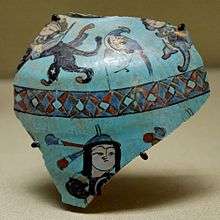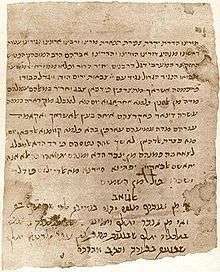fragment
English


Etymology
Borrowed from Latin fragmentum (“a fragment, remnant”), from frangere, present active infinitive of frangō (“I break”). See also fraction.
Pronunciation
- (noun) IPA(key): /ˈfɹæɡmənt/
- (verb) IPA(key): /fɹæɡˈmɛnt/, /ˈfɹæɡmɛnt/
Noun
fragment (plural fragments)
- A part broken off; a small, detached portion; an imperfect part, either physically or not
- 2012, William Matthews, The Tragedy of Arthur, University of California Press, page 68:
- […] and two enormous Scottish poems, the Buik of Alexander, which has been improbably ascribed to Barbour, and Sir Gilbert Hay's Buik of Alexander the Conquerour; one nearly complete Prose Life of Alexander and fragments of four others; a stanzaic translation of the Fuerres de Gadres which survives only in a fragment, the Romance of Cassamus, and three seperate translations of the Secreta Secretorum.
- a fragment of an ancient writing
- I heard a small fragment of the conversation.
-
- (grammar) A sentence not containing a subject or a predicate.
- (computing) An incomplete portion of code.
Related terms
Translations
|
|
Verb
fragment (third-person singular simple present fragments, present participle fragmenting, simple past and past participle fragmented)
Synonyms
Derived terms
Translations
|
|
|
|
Further reading
- fragment in Webster’s Revised Unabridged Dictionary, G. & C. Merriam, 1913.
- fragment in The Century Dictionary, New York, N.Y.: The Century Co., 1911.
Catalan
Etymology
Borrowed from Latin fragmentum (“a fragment, remnant”), from frangere (“to break”).
Pronunciation
Dutch
Etymology
Borrowed from Latin fragmentum (“a fragment, remnant”), from frangere (“to break”).
Pronunciation
Audio (file) - Hyphenation: frag‧ment
- Rhymes: -ɛnt
French
Etymology
Borrowed from Latin fragmentum (“a fragment, remnant”), from frangere (“to break”).
Pronunciation
- IPA(key): /fʁaɡ.mɑ̃/
Audio (France, Paris) (file) - Homophone: fragments
- Hyphenation: frag‧ment
Derived terms
Related terms
Further reading
- “fragment” in le Trésor de la langue française informatisé (The Digitized Treasury of the French Language).
Norwegian Bokmål
Etymology
Borrowed from Latin fragmentum
Noun
fragment n (definite singular fragmentet, indefinite plural fragment or fragmenter, definite plural fragmenta or fragmentene)
- a fragment
Related terms
Norwegian Nynorsk
Etymology
Borrowed from Latin fragmentum
Noun
fragment n (definite singular fragmentet, indefinite plural fragment, definite plural fragmenta)
- a fragment
Related terms
Polish
Etymology
Borrowed from Latin fragmentum.
Pronunciation
- IPA(key): /ˈfraɡ.mɛnt/
audio (file)
Declension
| singular | plural | |
|---|---|---|
| nominative | fragment | fragmenty |
| genitive | fragmentu | fragmentów |
| dative | fragmentowi | fragmentom |
| accusative | fragment | fragmenty |
| instrumental | fragmentem | fragmentami |
| locative | fragmencie | fragmentach |
| vocative | fragmencie | fragmenty |
Romanian
Etymology
Borrowed from French fragment and its source, Latin fragmentum.
Declension
Serbo-Croatian
Etymology
Borrowed from Latin fragmentum.
Pronunciation
- IPA(key): /frǎɡment/
- Hyphenation: frag‧ment
Declension
Swedish
Etymology
Borrowed from Latin fragmentum.
Pronunciation
Audio (file)
Declension
| Declension of fragment | ||||
|---|---|---|---|---|
| Singular | Plural | |||
| Indefinite | Definite | Indefinite | Definite | |
| Nominative | fragment | fragmentet | fragment | fragmenten |
| Genitive | fragments | fragmentets | fragments | fragmentens |
Related terms
- fragmentarisk
- fragmentera
- fragmentering
- fragmentisera
- fragmentisering
References
- fragment in Svenska Akademiens ordlista över svenska språket (13th ed., online)